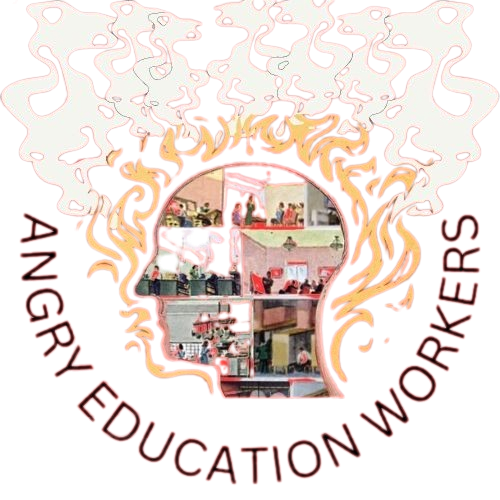Research Resources
To understand the exploitation and alienation we experience in our individual workplaces, we have to research widely and deeply about matters that, on their surface, have nothing to do with our jobs. Most educators—most workers—struggle to dedicate the time and energy necessary to do this sort of research. That’s where people like Christina, myself, and collective projects like Angry Education Workers come in: to streamline the process. Over the years, we have taught ourselves how to carry out workers’ self-inquiry in the education industry. But it’s only been through collaboration with other education workers that we’ve been able to develop a more systematic approach to dredging up information about education under capitalism.
Below, we lay out some concrete advice and methods for performing research on such a vast, diverse, and global industry as education. You’ll find specific resources with notes. In the other pages in this section, you'll find other major resources we offer for your use.

Research:
- Your local public library branch
Libraries are some of the best resources at your disposal. You can find books and other sources that you might not find anywhere else. And they almost always have lots of ways to access their materials online. If you don’t already, go get a membership at your local library!
Online library connected to brick and mortar library branches. You can reserve books online and then pick them up in real life.
Another online library (probably) connected to your local brick and mortar library branch.
An open access journal run by a team of library workers, for library workers. It centers workers’ perspectives in the high quality research it publishes.
An absolute treasure trove of research resources, including obscure books that are otherwise impossible to find in print. In my experience, it has been especially useful for finding texts on the early education industry.
This is the best resource I have found for fast facts about the education industry in the United States. Whenever I need some random bit of data, the NCES is a reliable source.
One of the best places to find academic research on history, including education history. You need a membership to see all the articles, but your local library might provide public access. And if you work or study at a college or university, you may also have access.
The online version of the History of Education Quarterly journal, a publication of The History of Education Society. It is a great source for high quality research on the global history of the industry. They also have a podcast and a blog.
A website with a whole bunch of different academic papers. While most of them aren’t related to education, many are, so it’s come in handy more than a few times for me.
Free research database maintained by the Department of Education.
The National Council on Teacher Quality is a pro-privatization group and should not be trusted. That said, it has a database of state laws on teachers’ unions and other education policy that is useful from time to time.
Education journalist and advocate who keeps a close eye on the moves of the forces of privatization in education.
One of my favorite sources for investigative journalism from reporters with revolutionary politics.
- Charter School Alliance newsletters
Chances are, the National Charter School Alliance has a local affiliate near you. And it’s likely they have a newsletter, website, or both. This applies to philanthropic foundations, as well. You can use these to keep tabs on what these groups are doing and what they think is important.
NPE is an advocacy group whose goal is to fight for public education against the forces of privatization. It produces and shares research on those waging war against public schools, which I have found particularly useful. Especially noteworthy is their Toolkit: School Privatization Explained, which is a webpage full of rebuttals of common “education reform” talking points.
MPU is one of my go to sources for hard hitting investigative labor journalism. They don’t do as many education focused stories, but I still find their work incredibly useful to my research.
Accessing sources
This link is to the Firefox browser version, but it’s available on other browsers, too. The name is pretty self explanatory—it’s a reliable way to get around annoying paywalls.
This link is also to the Firefox browser version but can be found on others. You can access a ton of articles from academic journals that are normally hidden behind paywalls, including many articles on JSTOR.
Best for STEM articles, but I’ve also been able to use this site to download quite a few academic papers on education history, studies of global privatization, and other useful resources.
- Feedbro browser extension
You can install this extension on most browsers. You can add links to most news websites, blogs, and journals. It’s made it really easy for me to keep tabs on what’s going on in education by collecting articles from a ton of different sources in one place.
Education news
Blog run by education journalist, and former educator of 30 years, Peter Greene. He is possibly the best education journalist I have ever encountered. He is essential reading for keeping track of the right-wing assault on education.
Education journalist Andy Spears focuses mostly on his local context in Tennessee, but his coverage is still relevant for the rest of us. His reporting on the cancer of Hillsdale College’s charter school scheme, for example, illuminates one of the largest threats public education faces in the United States.
Another progressive education journalist and advocate for public schools, Thomas Ultican’s blog is basically an archive of information about the scourge of privatization in education.
The blog of teacher, activist, and worker-intellectual Steven Singer. His work has been instrumental in conveying the threat of the “education reform” movement to other teachers, as well as the wider public.
The newsletter of the Los Angeles Chapter of the California Faculty Association (CFA). It focuses mostly on spreading important information about union matters to their membership, including many calls to action.
Newsletter of the Virginia Caucus of Rank and File Educators within the Richmond Education Association (REA). It gives us a window into the struggles workers are waging within their unions for a new type of unionism, as well as ways to make contact with like-minded worker-organizers.
Newsletter of the Movement of Rank and File Educators within the United Federation of Teachers (UFT), New York City’s AFT affiliate. This is another great glimpse into the struggles workers are waging within their unions.
Retired teacher unionist Fred Klonsky helps me to keep up to date on what nonsense the public boss class is always trying to pull on teachers—and public sector employees more broadly—in Illinois.
Newsletter by a rank-and-file organizer in the Movement of Rank and File Educators in the UFT. He provides detailed coverage of attempts to squelch out any traces of union democracy in the UFT.
Regular education news sites:
- Inside Higher Ed
- Higher Ed Dive
- K-12 Dive
- EdSurge
- ASCD SmartBrief
- Bucks County Beacon
- The 74
- Education Next
- Education Week
Theory and Strategy
“The Union Library Workers blog was originally a project of the Progressive Librarians Guild (PLG), an organization devoted to the open exchange of radical views on library and information issues. In 2023, it transitioned into a project of the American Library Association'-Allied Professional Association's Committee on the Salaries and Status of Library Workers”.
This is the best social justice education publication that I know of. It is an outstanding source of lesson plans, reflections on social justice pedagogy, and tangible ways for education workers to resist attacks on teaching the truth. A magazine subscription is only $2 a month.
For those in Virginia, follow this project that seeks to publicize worker struggles in the state, as well as treatises by and for workers on the labor movement, the left, and other topics.
One of the best publications about labor theory and strategy out there. Their coverage of the last few years teachers’ strikes has been high quality.
Labor theory, strategy, and news from a communist perspective. All of the articles are written by and for workers. While the publication doesn’t focus solely on education, they frequently report on education workers’ struggles. For example, they devoted an entire recent issue to strikes in the US higher education system.
The official publication of the IWW union. One of the best places to find coverage of underground workers’ struggles and labor theory.
A podcast hosted by labor journalist Maximillian Alvarez. He interviews rank-and-file workers of diverse backgrounds about their struggles and triumphs as they fight for their rights as working people. His coverage of Wisconsin teacher union history, the unionization of Caliber Beta Academy charter schools, and other labor struggles in education are particularly relevant.
Citing sources
In my opinion, this is the best application for saving and citing your sources. With the browser extension, you can save source information with the click of a button. Then, you can add in any anything the extension missed, and create bibliographies in whatever citation format you want. I have used it since high school, and now it is my go to for my research on education.
This is the best place to go when you have questions about source citation, besides Zotero. The website has countless thorough tutorials on how to cite different resources in different formats.
Communities
There are quite a few online communities, such as subreddits and discord servers, where large numbers of educators congregate. These are great places to connect with other education workers. They also are hubs for sharing experiences, stories, and resources that make them useful as a means of keeping your ear to the ground.
You can also find even more specifically tailored education subreddits, especially in the sidebar of the r/Teachers subreddit.
- r/Teachers
- r/Education
- r/TeachersOfColor
- r/GradSchool
- r/HigherEducation
- r/TeacherReality
- r/AnarchistTeachers
- Teachers' Lounge Discord Server
- Education Network Discord Server
